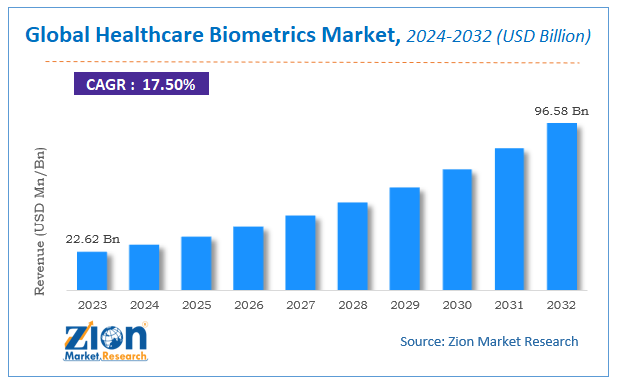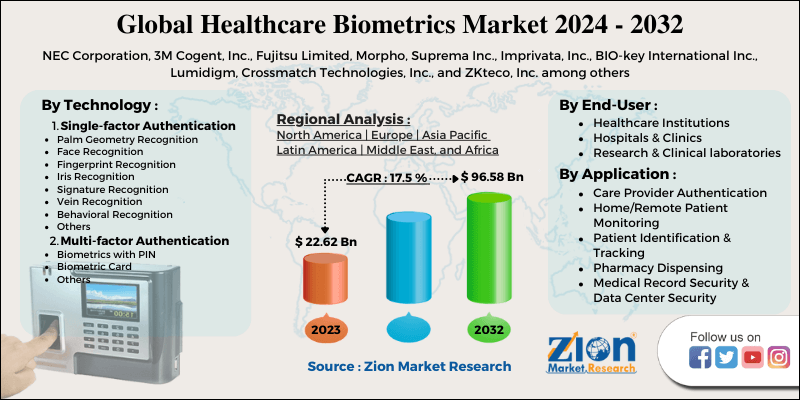Healthcare Biometrics Market Size, Share, Analysis, Trends, Growth Report, 2032

Healthcare Biometrics Market by Technology (Single-factor Authentication, Multi-factor Authentication) by End-User (Healthcare Institutions, Hospitals & Clinics, Research & Clinical Laboratories) by Application (Care Provider Authentication, Home/Remote Patient Monitoring, Patient Identification & Tracking, Pharmacy Dispensing, Medical Record Security & Data Center Security, Others): Global Industry Perspective, Comprehensive Analysis and Forecast, 2024 - 2032-
| Market Size in 2023 | Market Forecast in 2032 | CAGR (in %) | Base Year |
|---|---|---|---|
| USD 22.62 Billion | USD 96.58 Billion | 17.5% | 2023 |
Healthcare Biometrics Market Size
According to Zion Market Research, the global Healthcare Biometrics Market was worth USD 22.62 Billion in 2023. The market is forecast to reach USD 96.58 Billion by 2032, growing at a compound annual growth rate (CAGR) of 17.5% during the forecast period 2024-2032. The report offers a comprehensive analysis of the market, highlighting the factors that will determine growth, potential challenges, and opportunities that could emerge in the Healthcare Biometrics Market industry over the next decade.
The report analyzes the global healthcare biometrics market drivers, restraints/challenges, and the effect they have on the demands during the projection period. In addition, the report explores emerging opportunities in the healthcare biometrics industry.
Global Healthcare Biometrics Market: Overview
Healthcare professionals today are searching for ways to deliver timely and quality care while ensuring the confidentiality of their patients, and biomedical technology provides a powerful solution. Healthcare biometrics enables users to easily access apps and patient data.
Biometric technology such as palm vein readers, fingerprint scanners, iris scanners, facial recognition technology, and others have long been committed to tightening the identification of patients and employees. It will help to verify accurately that patients are who they claim they are, ensure that caregivers work with appropriate medical and demographic records, and verify that only the authorized staff have access to the information.
Biometrics innovations, however, have been reluctant to catch up in healthcare. Certainly, several clinics and hospitals have adopted some basic technologies, but biometrics has not yet been entirely at the forefront of healthcare practices. Moreover, it will still take some time and commitment on the part of healthcare Chief Information Security Officers (CISOs) and biometry technology to get the technology to float in the mainstream.
Global Healthcare Biometrics Market: Growth Factors
With the rapid digitization of health records, the possibility of data breaches in the healthcare sector has risen dramatically. Taking this into account, governments in different countries have adopted legislation to address the safety issues of patients.
The Health Insurance Portability and Accountability Act (HIPAA) of 1996 required the United States Secretary of Health and Human Services (HHS) department to create regulations to protect the security and privacy of certain health records. In line with this requirement, the HHS department introduced what is popularly called as the HIPAA Security Rule and the HIPAA Privacy Rule. In addition, healthcare organizations that breach any HIPAA law face substantial financial penalties.
This evolving regulatory dynamic in the North American region has led to an increase in demand for effective security measures to comply with these requirements. As biometric technologies are regarded as the most reliable and convenient method of ensuring protection, the implementation of these technologies has dramatically increased as a result of the incorporation of these legislations. In addition, the United States is seen as a leader in the adoption of biometric technology in healthcare facilities.
Impact due to the outbreak of COVID-19
The outbreak of COVID-19 has made people wary of touching any devices such as keypads, card readers, etc. that promote identity authentication; a market-friendly feature. Technologies, such as iris and facial recognition, are witnessing even greater demand amid the onset of SARS-CoV-2, in line with the growing usage of online healthcare services as a result of the global lockdown.
Contactless biometric systems are thus favored because they help prevent the spread of diseases such as the novel coronavirus and more. In light of these favorable attributes, it is fair to conclude that healthy growth in the healthcare biometrics market can be observed in the coming years, with COVID-19 emerging as an unexpected opportunity.
Global Healthcare Biometrics Market: Segmentation
The multi-factor authentication segment is expected to grow at the highest CAGR. Multi-factor authentication has evolved significantly within the healthcare industry due to its role in ensuring both security and reliability. According to the Office of the National Coordinator for Health Information Technology, the use of multi-factor authentication by non-federal acute care hospitals has expanded by 53 percent since 2010.
On the basis of single-factor authentication, vein recognition is anticipated to grow at the highest CAGR during the forecast period. It is known to be a secure and extremely safe biometric modality because palm vein biometrics rely on detecting the vein pattern under the skin. Unlike biometric fingerprint technology that relies on the skin integrity on the fingertip for accurate recognition and can be adversely affected by wounds, bruises, and dirt, however, the integrity of the skin is not an issue with vein recognition.
Based on end users, the healthcare sector is expected to dominate the market and develop at the highest CAGR in the forecast era. Increased use of biometric solutions to protect data equipment enclosures, pedestrian platforms linked to the Internet of Things (IoT), and workflow management are the factors driving the market.
In terms of application, the medical record and data center security segment is the fastest-growing segment in the Healthcare Biometrics industry. As Electronic Health Records (EHRs) are increasingly implemented in medical centers, concerns about the protection of information sharing and data privacy have increased as it is essential to properly maintain, store and link medical and sensitive patient data through networks.
Biometric technologies provide healthcare professionals and health data center operators with reliable, effective, and convenient solutions in this regard. Biometric systems ensure that access is given only to approved persons, in particular in the case of sensitive specimens in data centers, confidential patient details, and ongoing patent studies. In addition, these innovations build operational efficiencies for all ID procedures, reduce the duplication of medical records and remove the risk of theft of medical identity.
Healthcare Biometrics Market: Report Scope
| Report Attributes | Report Details |
|---|---|
| Report Name | Healthcare Biometrics Market |
| Market Size in 2023 | USD 22.62 Billion |
| Market Forecast in 2032 | USD 96.58 Billion |
| Growth Rate | CAGR of 17.5% |
| Number of Pages | 110 |
| Key Companies Covered | NEC Corporation, 3M Cogent, Inc., Fujitsu Limited, Morpho, Suprema Inc., Imprivata, Inc., BIO-key International Inc., Lumidigm, Crossmatch Technologies, Inc., and ZKteco, Inc. among others. |
| Segments Covered | By Technology, By End-User, By Application, And By Region |
| Regions Covered | North America, Europe, Asia Pacific (APAC), Latin America, Middle East, and Africa (MEA) |
| Base Year | 2023 |
| Historical Year | 2018 to 2022 |
| Forecast Year | 2024 - 2032 |
| Customization Scope | Avail customized purchase options to meet your exact research needs. Request For Customization |
Global Healthcare Biometrics Market: Regional Analysis
By Geography, the healthcare biometrics market is segmented into North America, Europe, Latin America, Asia Pacific, and the Middle East and Africa.
North America is currently the market leader and will also be able to gain more traction in the coming years due to the large number of frauds and crimes committed in the healthcare sector. The existence of a high incidence of fraudulent activity is projected to increase the adoption rate of these technically sophisticated biometric systems for the processing of patient data and registration data. Furthermore, the arrival of new healthcare facilities, such as clinics and hospitals, particularly across Canada and the United States, may serve as the primary driving force for the expansion of this market in the region.
Face recognition, in specific the 3D form, is one of the most favored biometric systems in the region, since it can be used in darkness as effectively as in light and can be used to identify objects at multiple angles.
The demand for biometric healthcare in Europe is very lucrative, considering the steady rise in the digitization of the healthcare sector and the consequent increase in data violation cases over the years. Taking into account the increase in these malicious attacks and the need to monitor them, governments are thinking up new regulations to further solve data-related safety issues in the healthcare sector.
Asia Pacific, on the other hand, is expected to see the highest growth due to factors such as growing government funding, the advent of IoT apps, the increasing advancement of IT healthcare, and the digital patient monitoring system. In addition, new government-led initiatives and increasing database security lapses are also supposed to enhance business growth in the forecast era.
Global Healthcare Biometrics Market: Competitive Players
The major players in the global healthcare biometrics market include
- NEC Corporation
- 3M Cogent.Inc.
- Fujitsu Limited
- Morpho
- Suprema Inc.
- Imprivata.Inc.
- BIO-key International Inc.
- Lumidigm
- Crossmatch Technologies.Inc.
- ZKteco. Inc.
- among others.
The report segment of the global healthcare biometrics market is as follows:
Global Healthcare Biometrics Market: Technology Segment Analysis
- Single-factor Authentication
- Palm Geometry Recognition
- Face Recognition
- Fingerprint Recognition
- Iris Recognition
- Signature Recognition
- Vein Recognition
- Behavioral Recognition
- Others
- Multi-factor Authentication
- Biometrics with PIN
- Biometric Card
- Others
Global Healthcare Biometrics Market: End-User Segment Analysis
- Healthcare Institutions
- Hospitals & Clinics
- Research & Clinical laboratories
Global Healthcare Biometrics Market: Application Segment Analysis
- Care Provider Authentication
- Home/Remote Patient Monitoring
- Patient Identification & Tracking
- Pharmacy Dispensing
- Medical Record Security & Data Center Security
- Others
Global Healthcare Biometrics Market: Regional Segment Analysis
- North America
- The U.S.
- Canada
- Europe
- France
- The UK
- Spain
- Germany
- Italy
- Rest of Europe
- Asia Pacific
- China
- Japan
- India
- South Korea
- Southeast Asia
- Rest of Asia Pacific
- Latin America
- Brazil
- Mexico
- Rest of Latin America
- Middle East & Africa
- GCC
- South Africa
- Rest of Middle East & Africa
Table Of Content
Methodology
FrequentlyAsked Questions
The expansion of the healthcare biometrics market is driven by increasing data security concerns, rising healthcare fraud, and the need for improved patient identification and access control.
According to Zion Market Research, the global Healthcare Biometrics Market was worth USD 22.62 Billion in 2023. The market is forecast to reach USD 96.58 Billion by 2032, growing at a compound annual growth rate (CAGR) of 17.5% during the forecast period 2024-2032.
North America has been leading the Universal Flash Storage Market and is anticipated to continue on the dominant position in the years to come.
The major players in the global healthcare biometrics market include NEC Corporation, 3M Cogent, Inc., Fujitsu Limited, Morpho, Suprema Inc., Imprivata, Inc., BIO-key International Inc., Lumidigm, Crossmatch Technologies, Inc., and ZKteco, Inc. among others.
Choose License Type
List of Contents
Market SizeOverviewGrowth FactorsImpact due to the outbreak of COVID-19GlobalHealthcare BiometricsSegmentationReport ScopeGlobalHealthcare BiometricsMarket:Regional AnalysisGlobalHealthcare BiometricsCompetitive PlayersThe report segment of the global healthcare biometrics market is as follows:RelatedNews
HappyClients
Zion Market Research
Tel: +1 (302) 444-0166
USA/Canada Toll Free No.+1 (855) 465-4651
3rd Floor,
Mrunal Paradise, Opp Maharaja Hotel,
Pimple Gurav, Pune 411061,
Maharashtra, India
Phone No +91 7768 006 007, +91 7768 006 008
US OFFICE NO +1 (302) 444-0166
US/CAN TOLL FREE +1 (855) 465-4651
Email: sales@zionmarketresearch.com
We have secured system to process your transaction.
Our support available to help you 24 hours a day, five days a week.
Monday - Friday: 9AM - 6PM
Saturday - Sunday: Closed







